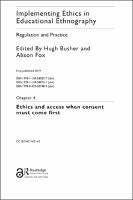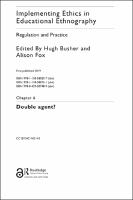Implementing Ethics in Educational Ethnography
Regulation and Practice
| dc.contributor.editor | Busher, Hugh | |
| dc.contributor.editor | Fox, Alison | |
| dc.date.accessioned | 2021-02-10T12:58:18Z | |
| dc.date.issued | 2019 | |
| dc.date.submitted | 2019-12-05 10:22:50 | |
| dc.date.submitted | 2020-04-01T10:26:59Z | |
| dc.identifier | 1004985 | |
| dc.identifier | OCN: 1135845084 | |
| dc.identifier | http://library.oapen.org/handle/20.500.12657/25107 | |
| dc.identifier.uri | https://directory.doabooks.org/handle/20.500.12854/36334 | |
| dc.description.abstract | Providing theoretical grounding, case studies and practical solutions, Implementing Ethics in Educational Ethnography examines how researchers can overcome ethical dilemmas associated with and encountered during ethnographic research. From the initial stages of research design such as consideration from regulatory bodies, through research occurring in the field to project completion and reporting, it explores many of the factors associated with ensuring culturally sensitive and ethical studies. The book covers key questions including: What can researchers expect of ethical review boards? Where and with whom should dialogue take place about ethicality within research? What effect does a research focus have on regulation and research practice? What is the effect of context on ethical practices? Does the positionality of a researcher have an effect on ethical practices? How do we ensure that ethicality supports the trustworthiness of research projects? Using a range of international case studies, Implementing Ethics in Educational Ethnography provides researchers and students with invaluable details about how to navigate the field, ensuring that they can sustain good ethical practice throughout the life of a research project. | |
| dc.language | English | |
| dc.rights | open access | |
| dc.subject.classification | thema EDItEUR::J Society and Social Sciences::JB Society and culture: general::JBF Social and ethical issues::JBFV Ethical issues and debates | en_US |
| dc.subject.classification | thema EDItEUR::J Society and Social Sciences::JN Education | en_US |
| dc.subject.other | Ethics | |
| dc.subject.other | educational ethnograpy | |
| dc.title | Implementing Ethics in Educational Ethnography | |
| dc.title.alternative | Regulation and Practice | |
| dc.type | book | |
| oapen.relation.isPublishedBy | fa69b019-f4ee-4979-8d42-c6b6c476b5f0 | |
| oapen.relation.hasChapter | Chapter 4 Ethics and access when consent must come first | |
| oapen.relation.hasChapter | Chapter 6 Double agent? | |
| oapen.relation.isbn | 9781138580251; 9780429507489 | |
| oapen.imprint | Routledge | |
| oapen.peerreview | Proposal review | |
| peerreview.review.type | Proposal | |
| peerreview.anonymity | Single-anonymised | |
| peerreview.reviewer.type | Internal editor | |
| peerreview.reviewer.type | External peer reviewer | |
| peerreview.review.stage | Pre-publication | |
| peerreview.open.review | No | |
| peerreview.publish.responsibility | Publisher | |
| peerreview.id | bc80075c-96cc-4740-a9f3-a234bc2598f1 | |
| peerreview.title | Proposal review |
Files in this item
| Files | Size | Format | View |
|---|---|---|---|
|
There are no files associated with this item. |
|||
This item appears in the following Collection(s)
Chapters in this book
-
(2019)Formalised procedures to obtain and document informed consent from research participants are at the heart of the shift from informal to formalised research ethics. Critiques claim that the requirements to obtain consent ...
-
(2019)This chapter will focus on the positionality of a teacher-researcher as a moral agent (Macfarlane 2009) when conducting ethnography. As Guillemin and Gillam above, I find the double role of a teacher-researcher informing ...


